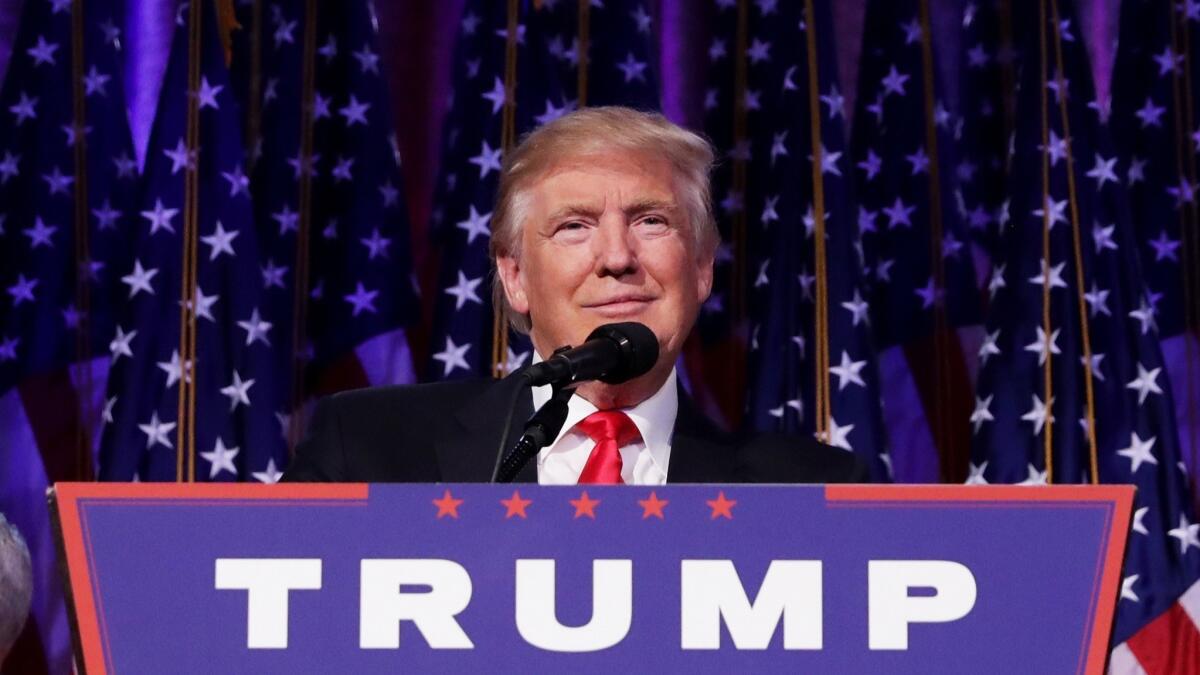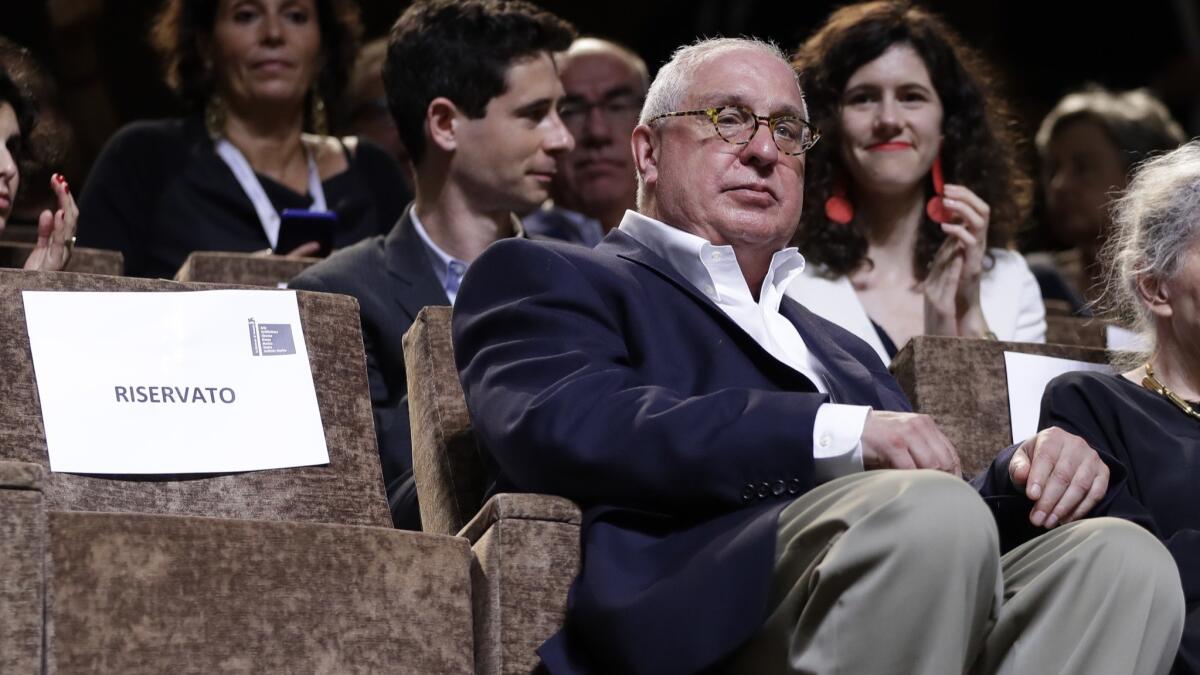How did Donald Trump become president? A slew of new documentaries tackle the question

- Share via
When Donald Trump was elected president in 2016, his victory stunned millions. For months, nearly every prognosticator and major media outlet had predicted Hillary Clinton would easily win the election. And yet Trump — the man best known to many as the host of the reality show “The Apprentice” — had beaten the odds.
“It was a very dark day when those election returns came in,” recalled filmmaker Errol Morris. “For me, it represented a disaster on so many levels. I had most certainly feared the possibility of Donald Trump being elected, and my worst fears were realized.”
Morris, an Academy-Award winning documentarian behind films like “The Thin Blue Line,” was not the only one of his peers left feeling gutted. Which is why nearly two years after Trump’s victory, a slew of documentaries examining how the businessman-turned-politician managed to become president are headed to theaters.
The first, by Michael Moore, has already been out for a month: “Fahrenheit 11/9,” which trains its lens on how the media and the electoral college contributed to Trump’s win. Moore was famously one of the few liberal Democrats to predict Trump had a real shot at becoming president, and in promoting the movie, which had its world premiere at the Toronto International Film Festival in September, he suggested that a radical type of activism would be needed to flip the House on Nov. 6.
Midterms 2018: How politics and the arts are colliding »
But if the box office receipts for “Fahrenheit 11/9” are any indication, Americans may not have the bandwidth — or interest — in exploring the country’s political climate in a movie theater. Since its release on Sept. 21, Moore’s latest film has collected $6.3 million — a strong number for the nonfiction genre, but a disappointment considering the ultra-wide release, heavy marketing and track record of the filmmaker himself. (Moore’s George W. Bush indictment, “Fahrenheit 9/11,” remains the highest-grossing documentary ever with a whopping $222 million worldwide.)
Morris, meanwhile, is still seeking distribution for his post-election film, “American Dharma,” about Trump’s former chief strategist Stephen K. Bannon. Despite high-profile screenings at key fall film festivals in Venice and Toronto, the veteran documentarian has been unable to convince buyers that moviegoers will be interested in an entire film about the polarizing figure. (Cinetic Media, which is handling press for the movie, said the film’s sales team is “talking with multiple theatrical companies and broadcasters as well as international distributors.”)
Simply giving Bannon a platform to speak has drawn intense criticism from some quarters. Just before “American Dharma” debuted in Italy in September, Bannon was embroiled in U.S. controversy when it was announced he would be a headliner at the New Yorker Festival. After celebrity participants like John Mulaney, Judd Apatow and Jim Carrey learned Bannon was on the lineup, they all announced on social media that they would pull out of the event if the political advisor would be speaking. Subsequently, the magazine’s editor, David Remnick, canceled Bannon’s appearance.

Similarly, some film critics were puzzled as to why Morris had given Bannon so much attention. While the filmmaker has grilled political figures before — Robert S. McNamara in “The Fog of War,” Donald Rumsfeld in “The Unknown Known” — reviewers felt he went light on Bannon. “[W]atching ‘American Dharma,’ it’s hard to escape the feeling that Errol Morris got played,” wrote Variety. “The filmmaker comes off as a die-hard liberal romantic who’s desperate for Steve Bannon to reveal himself as a reasonable man.”
Morris pushed back on that criticism, saying he was interested in learning what makes Bannon “tick, why is he doing this, what really is his agenda” because “like it or not, he’s had a tremendous influence on the world around us, and it’s at our peril that we don’t try to come to grips with it.
“Bannon was interested in publicizing himself, clearly, and that fact alone gives pause for thought: Am I being used by him, or playing into his hand?” Morris acknowledged. “Am I offering him more of the publicity which he clearly craves? I would say that what I am trying to do is something that reveals something about him. For me, making movies is part of my curiosity about what the hell is going on in the world and trying to figure out things — at least for myself, if not others.”

Alexis Bloom, whose film “Divide and Conquer: The Story of Roger Ailes” focuses on the late Fox News chairman, said she was driven by a similar impulse. While her movie, which will be released by Magnolia Pictures on Dec. 7, was in the works long before Trump’s election, his win added a new dimension to the documentary.
“Large pockets of the East and West Coast genuinely thought a Trump presidency would never be possible, so when the impossible happens, you’ve got to retrace your steps and go: ‘What happened? Why did we so fundamentally misjudge this?’” she said. “Trump is a convenient sort of figurehead, but if you think he’s the problem, he isn’t. He’s just one part of it.”
Initially, Bloom wanted to make a documentary about Rupert Murdoch, who owns Fox News. But after reviewing footage of the media mogul, she decided he wasn’t as “colorful or introspective” as Ailes. And she felt Ailes’ impact on the political landscape had yet to be examined — the way in which he’d been “making his presence known and massaging the political landscape for decades” through his work on Ronald Reagan’s and George W. Bush’s presidential campaigns.
But the film also argues that it was Ailes’ rule at Fox News that played a major role in Trump’s win, noting that while newspaper readership is down, certain portions of the U.S. only get their news from the conservative-leaning network.
“I think Roger could have sunk any Republican candidate easily, and he was acutely aware of this,” she said. “Well before the election, Trump had a weekly call-in show every single Monday. He didn’t get another platform to do this. So when he announced his candidacy, they knew him.”
It’s an exploration of a media landscape far different than the one depicted in Charles Ferguson’s “Watergate: Or How We Learned to Stop an Out of Control President.” The four-hour movie, which will air as a three-night event on the History Channel beginning Nov. 2, details the scandal of Richard Nixon’s presidency and never explicitly mentions Trump. But as its title implies, Ferguson hopes viewers will recognize correlations between the events of 1972 and 2018.
“It’s about how America handled a systemic and constitutional crisis once upon a time, and certainly I hope that people will think about that when they think about our current situation,” said Ferguson.
Whatever one’s opinions of Mr. Trump and his conduct are, what’s going on now is not funny. It’s very serious.
— Charles Ferguson, director of ‘Watergate: Or How We Learned to Stop an Out of Control President’
The documentarian had been at work on his project for years when Trump was elected, and he was wary of “artificially” changing the movie to explicitly emphasize parallels. What he did do, however, was shift the tone. Initially, he said, “Watergate” was meant to be a political thriller with shades of dark comedy. But when Trump won, he made the film “more about the gravity of what occurred. Because whatever one’s opinions of Mr. Trump and his conduct are, what’s going on now is not funny. It’s very serious, and what might happen next year is also very serious.”
Given the churn of the 24/7 news cycle, the filmmakers say they understand why Americans might want to use a trip to the movies to escape instead of analyze. But Morris, for one, believes that comes at a cost.
“We live in a time so horrendously polarized, fearful and angry, where people argue you’re not supposed to talk about X or Y,” he said. “And I think the only way out is by examining it and talking about it. Pretending it didn’t happen is certainly not a solution. And it’s more than just condemning it. Increasing awareness of what’s going on, to me, is better than remaining silent.”
Follow me on Twitter @AmyKinLA
More to Read
Only good movies
Get the Indie Focus newsletter, Mark Olsen's weekly guide to the world of cinema.
You may occasionally receive promotional content from the Los Angeles Times.









